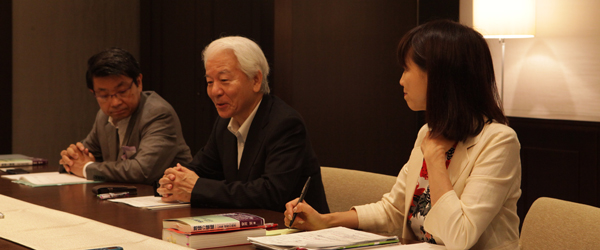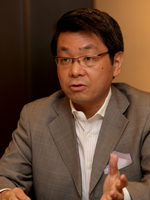What the JSR Group Needs to Do
to Continue to Step up Its CSR Initiatives

Acknowledging issues of climate change and resource procurement
that may affect the basis of the Group’s business
| Kubo | As its core business is founded on petrochemicals, the JSR Group has since its establishment, put efforts into conservation of the environment. In 2003, the Group made commitments to proactively fulfill all aspects of social responsibility that go beyond the environment. We established the CSR Committee that same year and the CSR Department in 2008. We regard it as essential both for CSR promotion and business management to engage in dialogue with society and incorporate the results of that dialogue into our activities. Today, we have experts with us who are well-acquainted with the JSR Group and are thus in a good position to provide valuable suggestions as representatives of society, and who constitute one of the stakeholders specified in our Management Policies. Since we will be listening to your insights, we hope to find out how the Group should fulfill its social responsibility in the coming years as we deal with a growing number of social issues. |
| Ms. Sonoda | Firstly, I’d like to make clear, from a long-term perspective until about 2050, what global and social issues the JSR Group will be confronted with and how these issues can affect the Group’s business. |
| Dr. Yasui | I’d like to point out three issues: resources, climate change, and biodiversity, all of which have global implications. The first important issue is the depletion of natural resources. Metal resources in particular have posed a critical problem. Known deposits of metal resources are expected to be depleted by 2050, and although new development projects are underway, inferior quality has become an obstacle. Consequently, at least for the time being, we must depend on recycling. The ideal approach would be the recycling of materials in human society while avoiding losses of any kind. To achieve this, challenges involving energy sources must be addressed. We aim to obtain all the energy we require for recycling from renewable energy. However, I’m afraid that this will be difficult. Oil and coal are usually used as fuel, but we shouldn’t waste these resources by simply burning them. They should be considered more as raw materials. Otherwise we will not be able to maintain a long-term equilibrium between society and such natural resources. Regarding the second issue, climate change, as seen in America, hurricanes and other forms of severe weather pose a significant risk to chemical companies that have a complex located by the sea. For example, Hurricane Sandy inflicted roughly \6 trillion in damage; 20% of all subway lines could not be restored even after one week, and it took one month before all electric power was finally restored. I doubt that there are many people in Japan who fully understand the magnitude of the impact. Important issues include where the threshold for climate change lies and whether people can alter their typical behavior in order to control climate change. I am also afraid that climate change has a huge negative impact on biodiversity that may result in the collapse of terrestrial ecosystems in Siberia and South China in the Northern Hemisphere. At present, Japan has set no mandatory targets for reducing greenhouse gas emissions toward the year 2020. However, by around 2015, some form of international targets for 2030 should begin being set. The point is how chemical companies will respond to such requirements. If climate change caused tangible damage, for instance, a carbon tax might be introduced by around 2050. |
| Shimizu | For chemical companies, energy is key to business operations. It is therefore an important issue how we, as a corporation, secure our energy sources. When planning solutions for these issues over the long-term until, say 2030, the important point is to think about when we should start preparing for action by taking necessary lead time into account. For example, the JSR Group uses coal boilers to generate a portion of the electricity and steam used at its plants. Coal is a reliable fuel considering the volume of reserves and stability of supply; however, there is a concern regarding CO2 emissions. As Dr. Yasui mentioned, coal is also a precious raw material. If there is a switch from coal to alternative energy sources, several steps will likely be involved, each lasting as long as 10 years. The introduction of renewable energy may be necessary under the national energy policy, but we cannot expect much from photovoltaic or wind power generation if the problem of instability remains unsolved. The electricity issue thus cannot be solved by one company alone and requires a long-term commitment by the national government and through an international framework. |
| Dr. Adachi |
However, the fuel or textile industries will scramble for bioresources and other unexploited resources if they are used as raw materials for bioplastics. Whatever the case may be, it is essential to examine the extent to which such resources can be secured. |
| Kawasaki | Speaking of raw materials, the method in which butadiene, a main raw material for synthetic rubber, is procured is also changing. From a global supply-demand perspective, butadiene is sure to face a shortage on a global basis, as the tire industries in emerging countries grow in parallel with auto industry development. I think it will be necessary for us to predict when butadiene will have limited availability. Butadiene is traditionally extracted from a by-product generated during the production of ethylene. However, Middle Eastern countries as well as the United States are beginning to produce low-cost ethylene using ethane gas and shale gas, respectively. Ethylene produced in these countries is becoming increasingly competitive while ethylene production in Japan is decreasing. Along with this worrisome trend, the volume of the by-product from which butadiene is extracted is also on the decline. Therefore, we now need to think about an alternative method to procure butadiene that doesn’t rely on this traditional by-product, and to accomplish this, we are currently developing the necessary technologies. We are examining the possibility of utilizing gas by-products generated during the process of oil refining or biomass. |
| Dr. Yasui | You need to be cautious when using bio-derived materials. As with rainforests, where many trees are cut down to make oil palm plantations to produce palm oil, the production of bio-derived materials often carries with it an adverse impact on biodiversity. |
Fulfilling corporate responsibility in
the chemical industry’s unique long value chain
| Ms. Sonoda | Dr. Adachi, what do you think are the issues that chemical companies are currently facing? |
| Dr. Adachi | The chemical industry is positioned in an extremely long value chain. Chemical companies need to address changes in both upstream material suppliers and downstream product users. Since their relationships are complicated, akin to a puzzle, it would be impossible for a single chemical company to adequately consider the environmental issues and CSR throughout the entire value chain. Therefore, to fulfill corporate responsibility, chemical companies need to both provide guidance to their suppliers and make necessary proposals to their customers. Due to problems with pollution, there are those who may wish to banish chemical plants from human communities. JSR, on the contrary, takes different perspective. Through the establishment of a chemical plant in the community, the company aspires to create a space where local habitats and human communities can coexist. The overall concept is to make its plants function as a space that connects local communities with surrounding ecosystems, rather than as simply a place to produce goods. I believe this concept is highly promising. |
| Kawasaki | The concept of upstream and downstream exists even within chemical complexes where our individual plants are located. A chemical complex is considered to be part of the community and often also contains the plants of our peer companies. We believe that we first need to make sure that sufficient consideration is being paid to the environment and to society by our own plants, and then try to involve all those around us as well as the national and local governments in order to make harmonized efforts. |
| Kubo | As a matter of fact, in Yokkaichi City where our main plant is located, we are collaborating with other companies to call on the local government to cooperate. In the past, Yokkaichi City had problems with pollution; however, we have begun to discuss how we and other companies in the neighborhood can collaborate with each other to create a city that can coexist with nature. |
| Kawasaki | Frequent chemical plant accidents that have taken place in recent years have provoked concern among local communities and society in general. As our chemical plants handle many hazardous substances, we are fully aware of our responsibility to pay due consideration to not causing pollution in the form of odors, noise, and other inconveniences to local communities and the surrounding environment. At JSR, we remind our employees continuously that our business cannot be sustained unless we implement rigorous safety measures at all times. |
| Dr. Adachi | The issue remaining to be addressed is how JSR can monitor and influence the policies that our material suppliers practice. For example, a project is in progress to issue a label certifying aluminum refined from bauxite that has been mined in such a way that minimizes the impact on surrounding areas as environmentally friendly. In the future, similar schemes will be devised for oil drilling. We have already witnessed an aversion by NGOs toward products that are not ethical as well as consumers who turned their back on such products. Such negative responses harm business performance and can evolve into a business risk. Although the Japanese oil industry has not yet been confronted with this scenario, it may be better for chemical companies to presently start investigating and examining from where and how the oil they use is obtained such a risk. |
| Hirano | In terms of relationships with suppliers, JSR’s procurement staff not only checks on the situation of tier 1 suppliers, but also tier 2 suppliers as a matter of course. We began this practice around 2000, at which time an American semiconductor manufacturer, after conducting an audit prior to transactions, pointed out that we had covered only some but not all of our tier 2 suppliers. It was a culture shock for us at that time, but this experience is still helping us even now. In fact, President Koshiba had a face-to-face meeting with the American manufacturer back then. I believe that the experience helped him to form the basis of today’s JSR management and CSR policies. |
| Dr. Adachi | Regarding biodiversity, JSR has taken part in the Japan Business Initiative for Biodiversity (JBIB) since four years ago. Except for JSR, no other chemical or material manufacturers showed interest in this activity at such an early stage and actually took concrete actions. JSR has been aware of what they are expected to do and taken steps accordingly. My impression about JSR, which I formed while working together with the company, is that they envision the future and do whatever is needed in a flexible manner. Calling on the local government for cooperation, which Mr. Kubo mentioned, is one such example. I hope JSR will continue expanding activities such as this. I also want JSR to communicate its activities to society at large so that it plays a leading role. |
| Kubo | By drafting a Business & Biodiversity Interrelationship Map as a part of JBIB activities, JSR was able to clearly show that we put the largest impact on biodiversity in materials and land. It is important for us to apply this approach to our business operations and expand it externally. |

